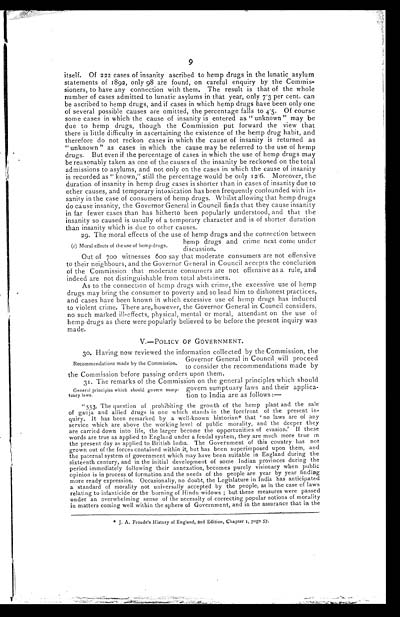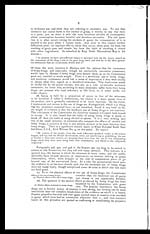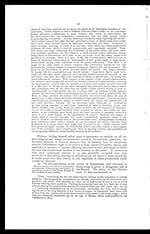Medicine - Drugs > Resolution. No. 1369 Ex. > Resolution. No. 1369 Ex.
(13) Page 9
Download files
Individual page:
Thumbnail gallery: Grid view | List view

9
itself. Of 222 cases of insanity ascribed to hemp drugs in the lunatic asylum
statements of 1892, only 98 are found, on careful enquiry by the Commis-
sioners, to have any connection with them. The result is that of the whole
number of cases admitted to lunatic asylums in that year, only 7.3 per cent. can
be ascribed to hemp drugs, and if cases in which hemp drugs have been only one
of several possible causes are omitted, the percentage falls to 4.5. Of course
some cases in which the cause of insanity is entered as "unknown" may be
due to hemp drugs, though the Commission put forward the view that
there is little difficulty in ascertaining the existence of the hemp drug habit, and
therefore do not reckon cases in which the cause of insanity is returned as
"unknown" as cases in which the cause may be referred to the use of hemp
drugs. But even if the percentage of cases in which the use of hemp drugs may
be reasonably taken as one of the causes of the insanity be reckoned on the total
admissions to asylums, and not only on the cases in which the cause of insanity
is recorded as " known," still the percentage would be only 12.6. Moreover, the
duration of insanity in hemp drug cases is shorter than in cases of insanity due to
other causes, and temporary intoxication has been frequently confounded with in-
sanity in the case of consumers of hemp drugs. Whilst allowing that hemp drugs
do cause insanity, the Governor General in Council finds that they cause insanity
in far fewer cases than has hitherto been popularly understood, and that the
insanity so caused is usually of a temporary character and is of shorter duration
than insanity which is due to other causes.
(c) Moral effects of the use of hemp drugs.
29. The moral effects of the use of hemp drugs and the connection between
hemp drugs and crime next come under
discussion.
Out of 700 witnesses 600 say that moderate consumers are not offensive
to their neighbours, and the Governor General in Council accepts the conclusion
of the Commission that moderate consumers are not offensive as a rule, and
indeed are not distinguishable from total abstainers.
As to the connection of hemp drugs with crime, the excessive use of hemp
drugs may bring the consumer to poverty and so lead him to dishonest practices,
and cases have been known in which excessive use of hemp drugs has induced
to violent crime. There are, however, the Governor General in Council considers,
no such marked ill-effects, physical, mental or moral, attendant on the use of
hemp drugs as there were popularly believed to be before the present inquiry was
made.
V.—POLICY OF GOVERNMENT.
Recommendations made by the Commission.
30. Having now reviewed the information collected by the Commission, the
Governor General in Council will proceed
to consider the recommendations made by
the Commission before passing orders upon them.
General principles which should govern sump-
tuary laws.
31. The remarks of the Commission on the general principles which should
govern sumptuary laws and their applica-
tion to India are as follows:—
"553. The question of prohibiting the growth of the hemp plant and the sale
of ganja and allied drugs is one which stands in the forefront of the present in-
quiry. It has been remarked by a well-known historian* that 'no laws are of any
service which are above the working level of public morality, and the deeper they
are carried down into life, the larger become the opportunities of evasion.' If these
words are true as applied to England under a feudal system, they are much more true in
the present day as applied to British India. The Government of this country has not
grown out of the forces contained within it, but has been superimposed upon them, and
the paternal system of government which may have been suitable in England during the
sixteenth century, and in the initial development of some Indian provinces during the
period immediately following their annexation, becomes purely visionary when public
opinion is in process of formation and the needs of the people are year by year finding
more ready expression. Occasionally, no doubt, the Legislature in India has anticipated
a standard of morality not universally accepted by the people, as in the case of laws
relating to infanticide or the burning of Hindu widows; but these measures were passed
under an overwhelming sense of the necessity of correcting popular notions of morality
in matters coming well within the sphere of Government, and in the assurance that in the
* J. A. Froude's History of England, 2nd Edition, Chapter I, page 57.
Set display mode to: Large image | Zoom image | Transcription
Images and transcriptions on this page, including medium image downloads, may be used under the Creative Commons Attribution 4.0 International Licence unless otherwise stated. ![]()
| India Papers > Medicine - Drugs > Resolution. No. 1369 Ex. > Resolution. No. 1369 Ex. > (13) Page 9 |
|---|
| Permanent URL | https://digital.nls.uk/74934055 |
|---|




